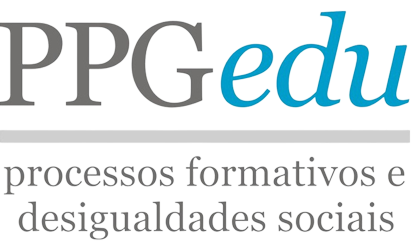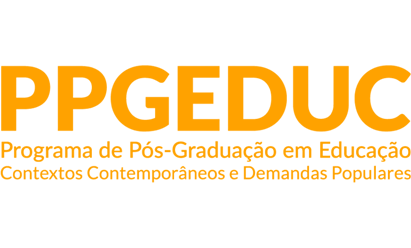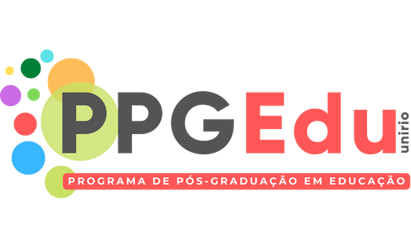Sobre la revista
Enfoque y alcance
La Revista Interinstitucional Artes de Educar (RIAE) es una publicación científica digital, con acceso libre, gratuita, editada por los Programas de Postgrado en Educación de las siguientes instituciones de Enseñanza Superior: Universidade do Estado do Rio de Janeiro/Faculdade de Formação de Professores (UERJ/FFP); Universidade Federal Rural do Rio de Janeiro/Instituto Multidisciplinar-Instituto de Educação (UFRRJ/IM-IE) y Universidade Federal do Estado do Rio de Janeiro (UNIRIO). Tiene como misión promover el arte de pensarpracticar la educación por medio del entrelazamiento de movimientos éticos, estéticos y políticos. El principal objetivo de la RIAE es divulgar la producción de investigadores(as) y de profesores(as) brasileños(as) o extranjeros(as), en el campo de la Educación, resultantes de investigaciones o de experiencias que contribuyan para el avance del conocimiento y de las prácticas con la escuela. Se trata, por lo tanto, de un periódico que publica dossiers temáticos conteniendo artículos, ensayos, reseñas, relatos de experiencias, entre otras contribuciones.
El alcance temático está clasificado en el CNPq como 7.00.00.00-0 Ciencias Humanas; 7.08.00.00-6 Educación.
Proceso de evaluación por pares
Las publicaciones estarán condicionadas a una evaluación previa de la Comisión Editorial y revisión doble ciego, dos evaluadores externos (a las instituciones de publicación). En caso de divergencia, se solicitará una tercera evaluación. Se examinarán los recursos y problemas específicos y la decisión se dará por la Comisión Editorial. La selección de los manuscritos para publicación tiene como criterios básicos: la contribución a la educación y a la línea editorial de la Revista, la originalidad del tema o del tratamiento que se le da, bien como la consistencia del abordaje teórico-metodológico.
Cuando se sugieran modificaciones de estructura o de contenido por los(las) evaluadores(as) o por la Comisión Editorial, se las deberán incorporar los autores(as) en el manuscrito como condición para posterior publicación. Las modificaciones hechas por los(las) autores(as) deberán volver a los(las) editores(as) de sección y, por consiguiente, a los(las) evaluadores(as) para que finalicen el proceso de evaluación. En el caso del número de artículos aprobados ser superior a la capacidad de publicación, la Comisión Editorial hará una selección de los manuscritos con mejores evaluaciones hechas por los(las) evaluadores(as) externos.
Los(as) evaluadores(as) externos que forman parte del grupo de evaluadores de los textos enviados son profesores(as)- investigadores(as) que se destacan por su actuación en el campo de la Educación y que están de acuerdo con la política editorial de la RIAE.
Los manuscritos enviados deberán tener el proceso de evaluación concluido en el tiempo máximo de cuarenta y cinco días.
Frecuencia de publicación
La RIAE es una publicación cuatrimestral. Sus publicaciones son, en general, en los meses de enero, mayo y septiembre, siendo cada una de las instituciones responsable por una edición. Además de eso, podrá, eventualmente, publicar dossiers especiales.
Política de acceso abierto
Esta es una revista de acceso abierto, lo que significa que todo el contenido está disponible gratuitamente sin costo alguno para el usuario o su institución. Los usuarios están autorizados a leer, descargar, copiar, distribuir, imprimir, buscar o enlazar los textos completos de los dos artículos, o utilizarlos para cualquier otro fin lícito, sin necesidad de obtener autorización previa del editor o autor. Esto está en línea con la definición de acceso abierto de la Iniciativa de Acceso Abierto de Budapest (BOAI – Budapest Open Access Initiative).
Política de Ética
Conflictos de Interésos conflictos, generalmente, surgen cuando autores (as), editores(as) o evaludores(as) poseen interés que, aparentes o no, influyen la elaboración o la evaluación de manuscritos, lo que puede ser de naturaleza personal, comercial, política, académica o financiera. La confiabilidad pública en el proceso de evaluación por pares y la credibilidad de artículos publicados dependen en parte de como esos conflictos de interés son administrados durante la redacción, la evaluación por pares y la toma de decisiones por los(las) editores(as).
Al enviar un manuscrito, los(las) autores(as) son responsables por reconocer y por revelar conflictos de naturaleza financiera o de naturaleza diversa que influyeron el trabajo. O sea, deberán reconocer, en el manuscrito, todo el apoyo financiero para el trabajo y otras conexiones financieras o personales con relación a la investigación.
Existe conflicto de interés, también, cuando el original está basado en una tesis o en una disertación. En este caso, se debe indicar el nombre del autor, el título, el año, el nombre del Programa de Postgrado y la institución en la que se presentó el trabajo.
Al realizar la evaluación, el (la) evaluador(a) deberá revelar a los(las) editores(as) de sección cualesquiera conflictos de interés que, por ventura, puedan influir en su opinión sobre el manuscrito, y, cuando sea el caso, debe declararse no calificado para evaluarlo.
Si no están seguros(as) los(las) autores(as)de lo que puede constituir un potencial conflicto de interés, deberán contactar el Consejo Editorial de la Revista.
Ética de Publicación y Declaración sobre malas prácticas
Es responsabilidad de los(las) autores(as), de los(las) evaluadores(as) y de los(las) editores(as) involucrado(as) en el proceso editorial preservar la ética alineada a los principios científicos.
Cabe a la Revista Interinstitucional Artes de Educar (RIAE) mantener la ética y la calidad de los textos publicados, teniendo sus directrices de acuerdo con:
- Las políticas de buenas prácticas editoriales indicadas por el Committee on Publication Ethics (COPE)https://publicationethics.org/core-practices
- El Informe de la Comisión de Integridad de Investigación del Consejo Nacional de Desarrollo Científico y Tecnológico (CNPq) http://cnpq.br/documentos-da-ciac/
- Las reglas de la comisión de ética de la Universidade do Estado do Rio de Janeiro, UERJ: http://www.sr2.uerj.br/sr2/coep/index.php?mod=regulamenta.htm
- Documento Ética e Pesquisa em Educação [Documento Ética e Investigación en Educación] - v. 1 (Anped):.
Autores(as):
En los artículos y relatos de experiencia, los(las) autores(as) deberán presentar una discusión objetiva sobre la investigación realizada o sobre la experiencia relatada, exponiendo detalles suficientes y referencias acerca del estudio realizado. De esa manera, afirmaciones que contengan fraude o imprecisión constituyen comportamiento antiético, por lo tanto, inaceptables. Las Reseñas también deben ser objetivas, comprensivas y llevar en cuenta el estado del arte de forma precisa. Los(las) autores(as) deberán asegurar que su trabajo es completamente original y que presenta adecuadamente sus referencias, a fin de no considerarse una copia de la obra de otros, pues plagio en todas sus formas constituye práctica antiética e inaceptable. Igualmente, enviar el mismo manuscrito para más de una Revista también constituye comportamiento antiético e inaceptable. Luego, los(las) autores(as) no deberán enviar manuscritos que describan sustancialmente la misma investigación para más de un periódico. El(la) autor(a) responsable por enviar la producción deberá, también, garantizar que tiene la aceptación de todos(as) los (las) coautores(as) sobre la versión final y de su envío para publicación. Además de eso, con el objetivo de la evaluación por doble ciego, no deberá haber ninguna referencia a los(las) autores(as) en el cuerpo del manuscrito enviado.
Editores(as):
Los(las) editores(as) de sección deberán evaluar manuscritos exclusivamente a partir de su mérito académico; no debiendo, en ninguna hipótesis, utilizar informaciones aún no publicadas en su propia investigación sin el consentimiento expreso de los (las) autores(las). Los(las) editores(as) deben tomar medidas razonables y responsivas en el caso de reclamaciones con relación a un manuscrito sometido o publicado. Los(las) editores(as) son corresponsables por la conducción del proceso de evaluación por doble ciego, asegurándoles de que no haya referencias a los(las) autores(as) en el texto enviado a los(las) evaluadores.
Evaluadores(as):
Los(las) evaluadores(as) deberán evaluar cada manuscrito recibido como documento confidencial. Informaciones privilegiadas o ideas obtenidas por medio de peer review deberán ser mantenidas bajo sigilo y no podrán ser utilizadas de forma a obtener ventaja personal. Las evaluaciones deberán ser conducidas de forma objetiva, y las observaciones deberán ser formuladas claramente con argumentos fundamentados, de forma que los(las) autores(as) puedan utilizarlas en el perfeccionamiento de sus manuscritos. Caso un(a) evaluador(a) seleccionado(a) se sienta descalificado(a) o imposibilitado(a) de realizar una evaluación, deberá comunicarle inmediatamente al(a la) editor(a). Los(las) evaluadores(as) no deberán aceptar manuscritos para análisis con los cuales posean cualquier conflicto de interés resultado de relaciones competitivas, colaborativas o de cualquier otro tipo.
Estatísticas
| Tendências | 2019 | 2020 | 2021 | 2022 | 2023 |
| Edições | 3 | 5 | 3 | 4 | 1 |
| Artigos | 35 | 62 | 82 | 61 | 18 |
| Total de itens publicados | 55 | 128 | 105 | 81 | 27 |
| Total de submissões | 174 | 324 | 190 | 315 | 240 |
| Avaliados pelos pares | 153 | 288 | 138 | 154 | 17 |
| Aceito | 110 (72%) | 179 (62%) | 111 (80%) | 113 (73%) | 12 (71%) |
| Rejeitado | 43 (28%) | 109 (38%) | 27 (20%) | 41 (27%) | 5 (29%) |
| Tempo de avaliação | 49 | 95 | 0 | 90 | 51 |
| Tempo até a publicação | 84 | 156 | 55 | 93 | 13 |
| Acessos | 30.191 | 57.454 | 94.925 | 61.292 | 21.423 |
Sponsors
Edital FAPERJ Nº 48/2021- APOIO À PUBLICAÇÃO DE PERIÓDICOS CIENTÍFICOS E TEC. E À INFRAESTRUTURA DE EDITORAS - 2021 Atividades em curso desde setembro de 2022. Universidade do Estado do Rio de Janeiro - Hospedagem, financiamento do Digital Object Identifier (DOI) e orientações editoriais.






















